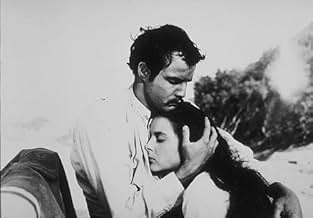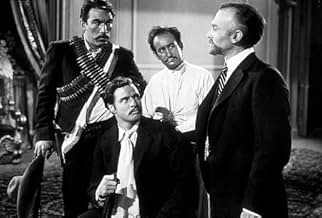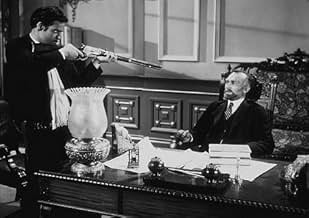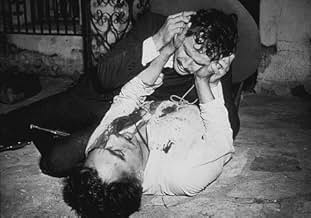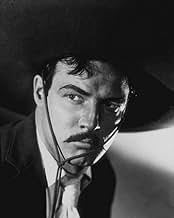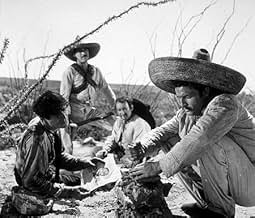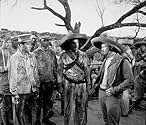CALIFICACIÓN DE IMDb
7.2/10
13 k
TU CALIFICACIÓN
La historia del revolucionario mexicano Emiliano Zapata, quien encabezó una rebelión contra la dictadura corrupta y opresiva del presidente Porfirio Díaz a principios del siglo XX.La historia del revolucionario mexicano Emiliano Zapata, quien encabezó una rebelión contra la dictadura corrupta y opresiva del presidente Porfirio Díaz a principios del siglo XX.La historia del revolucionario mexicano Emiliano Zapata, quien encabezó una rebelión contra la dictadura corrupta y opresiva del presidente Porfirio Díaz a principios del siglo XX.
- Dirección
- Guionistas
- Elenco
- Ganó 1 premio Óscar
- 5 premios ganados y 9 nominaciones en total
Rico Alaniz
- Guard
- (sin créditos)
Daniel Armijo
- Undetermined Secondary Role
- (sin créditos)
Ross Bagdasarian
- Officer
- (sin créditos)
Salvador Baguez
- Soldier
- (sin créditos)
- Dirección
- Guionistas
- Todo el elenco y el equipo
- Producción, taquilla y más en IMDbPro
Opiniones destacadas
Mexico, 1909. The people in the state of Morelos rise up against the tyrannical regime of President Porfirio Diaz. They are lead by a simple, illiterate peasant-farmer, Emilio Zapata. All he wants is justice and fairness for his people but as things progress he is drawn deeper into a civil war where allies and enemies are often difficult to tell apart.
Written by John Steinbeck, directed by Elia Kazan, starring Marlon Brando and Anthony Quinn, and based on a true story, on paper this has all the makings of a classic. The end result, however, is far from satisfactory.
The intention was good: show the life of a man of integrity and honour and the lengths he is willing to go to for the rights of his people, throw in a theme of how power corrupts, plus another theme of how a name can sustain a revolution.
Can't fault the performances either. Brando, in his third movie, puts in a strong performance as Zapata. The movie provided him with his second Oscar nomination, after only three movies (his first was in A Streetcar Named Desire, his second movie). Anthony Quinn won the Best Supporting Actor Oscar in 1953 for his portrayal of Eufemio, Zapata's brother.
No, it is in the execution, especially direction and editing, that things fall a bit short of their potential. The story is clumsily told by Elia Kazan. Scenes don't link well, some scenes seem entirely unnecessary and it is difficult to follow the history behind the sequence of events. No explanation is given for the seeming lack of continuity, eg Zapata is President, all seems well, then next we know it is back to civil war with Zapata a revolutionary. No detail for the change provided.
This sudden change of direction, without the events that changed the direction, is incredibly jarring and disconcerting.
So, in the end, you have a historic story with many of the historic details left out. Not ideal.
Overall, okay, but not great. While Elia Kazan was a great director, I can't help but think this movie would have been a masterpiece if someone like John Huston, or maybe John Ford, had directed it.
Written by John Steinbeck, directed by Elia Kazan, starring Marlon Brando and Anthony Quinn, and based on a true story, on paper this has all the makings of a classic. The end result, however, is far from satisfactory.
The intention was good: show the life of a man of integrity and honour and the lengths he is willing to go to for the rights of his people, throw in a theme of how power corrupts, plus another theme of how a name can sustain a revolution.
Can't fault the performances either. Brando, in his third movie, puts in a strong performance as Zapata. The movie provided him with his second Oscar nomination, after only three movies (his first was in A Streetcar Named Desire, his second movie). Anthony Quinn won the Best Supporting Actor Oscar in 1953 for his portrayal of Eufemio, Zapata's brother.
No, it is in the execution, especially direction and editing, that things fall a bit short of their potential. The story is clumsily told by Elia Kazan. Scenes don't link well, some scenes seem entirely unnecessary and it is difficult to follow the history behind the sequence of events. No explanation is given for the seeming lack of continuity, eg Zapata is President, all seems well, then next we know it is back to civil war with Zapata a revolutionary. No detail for the change provided.
This sudden change of direction, without the events that changed the direction, is incredibly jarring and disconcerting.
So, in the end, you have a historic story with many of the historic details left out. Not ideal.
Overall, okay, but not great. While Elia Kazan was a great director, I can't help but think this movie would have been a masterpiece if someone like John Huston, or maybe John Ford, had directed it.
Although in fact Emiliano Zapata never became president of Mexico, for the most part this is a pretty good account of the illiterate peasant who became a romantic revolutionary. For this portrayal in his third film Marlon Brando got a second Academy Award nomination for Best Actor, but lost to Gary Cooper for High Noon.
And as a film concerning the turmoil in Mexico during the teen and twenty years of the last century Viva Zapata! is far better than MGM's Viva Villa that starred Wallace Beery. Then again Marlon Brando is a much better actor.
One critical thing that was left out of the story is how much land the Roman Catholic Church held in Mexico. It was not just the rich Estancias that kept the masses in Mexico in peonage, the Church had a really big share of the real estate there. If the story were written today the Church's involvement would be shown. My guess is in the years of the Cold War and the height of Joe McCarthy, no one in Hollywood wanted to make a film that criticized the church in any way. But even a few years earlier the overreaction against the church was done in the John Ford film, The Fugitive which takes place within 10 to 20 years after Zapata died.
Zapata as played by Brando may be illiterate, but he is possessed of a simple eloquence and a charisma that made him a revolutionary figure, in the same manner Che Guevara became forty years later. He tries hard to hold to the ideals of the revolution, but finds as most do that tearing down a government is relatively easy, building one from scratch is a task that has defeated many.
Anthony Quinn plays Emiliano's swaggering brother Eufemio who's not quite as idealistic as Brando. Quinn received first Academy Award for Best Supporting Actor for the part. Quinn fills the screen with his bluster when he's on, it provides a perfect counterpoint to Brando's more idealistic role.
The guy who never gets praise for his performance is Joseph Wiseman. Wiseman, a product of the Actor's Studio in New York like Marlon Brando. This is a man whose type I've come across in numerous endeavors in my life, a professional stirrer of resentments. He's not happy unless there's some kind of battle going on. A type mind you that is ultimately dangerous for any movement. He intrigues for the sake of intrigue, but never accomplishes anything. It's a very good job by Wiseman, not often talked about for some reason.
Besides Quinn's Oscar and Brando's nomination, Viva Zapata! got Oscar nominations for Best Art&Set Direction for black and white film, Best music, and Best Screenplay. The last would have been a great honor for John Steinbeck, I'm not sure how many if any writers won a Pulitzer Prize, a Nobel Prize and an Oscar. That's three horse parlay that can't be beat.
For some reason Elia Kazan was overlooked for Best Director, possibly because he had won the year before for A Streetcar Named Desire.
Still Viva Zapata! is a work that stands up very well even with the historical inaccuracies.
And as a film concerning the turmoil in Mexico during the teen and twenty years of the last century Viva Zapata! is far better than MGM's Viva Villa that starred Wallace Beery. Then again Marlon Brando is a much better actor.
One critical thing that was left out of the story is how much land the Roman Catholic Church held in Mexico. It was not just the rich Estancias that kept the masses in Mexico in peonage, the Church had a really big share of the real estate there. If the story were written today the Church's involvement would be shown. My guess is in the years of the Cold War and the height of Joe McCarthy, no one in Hollywood wanted to make a film that criticized the church in any way. But even a few years earlier the overreaction against the church was done in the John Ford film, The Fugitive which takes place within 10 to 20 years after Zapata died.
Zapata as played by Brando may be illiterate, but he is possessed of a simple eloquence and a charisma that made him a revolutionary figure, in the same manner Che Guevara became forty years later. He tries hard to hold to the ideals of the revolution, but finds as most do that tearing down a government is relatively easy, building one from scratch is a task that has defeated many.
Anthony Quinn plays Emiliano's swaggering brother Eufemio who's not quite as idealistic as Brando. Quinn received first Academy Award for Best Supporting Actor for the part. Quinn fills the screen with his bluster when he's on, it provides a perfect counterpoint to Brando's more idealistic role.
The guy who never gets praise for his performance is Joseph Wiseman. Wiseman, a product of the Actor's Studio in New York like Marlon Brando. This is a man whose type I've come across in numerous endeavors in my life, a professional stirrer of resentments. He's not happy unless there's some kind of battle going on. A type mind you that is ultimately dangerous for any movement. He intrigues for the sake of intrigue, but never accomplishes anything. It's a very good job by Wiseman, not often talked about for some reason.
Besides Quinn's Oscar and Brando's nomination, Viva Zapata! got Oscar nominations for Best Art&Set Direction for black and white film, Best music, and Best Screenplay. The last would have been a great honor for John Steinbeck, I'm not sure how many if any writers won a Pulitzer Prize, a Nobel Prize and an Oscar. That's three horse parlay that can't be beat.
For some reason Elia Kazan was overlooked for Best Director, possibly because he had won the year before for A Streetcar Named Desire.
Still Viva Zapata! is a work that stands up very well even with the historical inaccuracies.
The story of Mexican revolutionary Emiliano Zapata (Marlon Brando), who led a rebellion against the corrupt, oppressive dictatorship of president Porfirio Diaz (Fay Roope) in the early 20th century.
Sadly, I do not know the story of Zapata well enough to criticize this film for its accuracy or lack thereof. I understand it is somewhat fictional, and of course needs to be to some extent since no one was there writing down every spoken word or action.
But I loved the story, the endless cycle of violence... this is all too true. While revolutions can work (America did alright), they do tend to lead to more revolutions. And while Mexico is stable now (or at least mostly so), it did have a rough history... which made legends out of Zapata and Pancho Villa.
Sadly, I do not know the story of Zapata well enough to criticize this film for its accuracy or lack thereof. I understand it is somewhat fictional, and of course needs to be to some extent since no one was there writing down every spoken word or action.
But I loved the story, the endless cycle of violence... this is all too true. While revolutions can work (America did alright), they do tend to lead to more revolutions. And while Mexico is stable now (or at least mostly so), it did have a rough history... which made legends out of Zapata and Pancho Villa.
The picture chronicles the Zapata life from his humble upbringing , he played a leading role in the Mexican 1910-1920 revolution until his death . A peasant delegation from Morelos state go to visit Mexican President Porfirio Diaz when Zapata (Marlon Brando) reclaims their rights .Then Zapata along with his brother Eufemio (Anthony Quinn) back to Francisco Madero (Harold Gordon) , though resident in Texas , against Porfirio Diaz . Pancho Villa (Alan Reed) in the northern Mexico and Zapata in the southern fight against Porfirio's Army winning many victories in the field . For a long time Zapata , who seemed in line for leadership of Mexico , enjoyed the sympathetic interest of the United States . Finally, Madero rises to power but General Huertas (Frank Silvera)conspires against him . Huertas rules over , and murders President Francisco Madero . Then Zapata again takes arms against Huertas and he along with Pancho Villa getting the victory in Mexico city and an eventual Presidency but he finishes leaving as a disillusioned politician . But his main enemies , the President Carranza and Obregon will fight for the power against the Villa's revolutionaries .The movie portrays until his early death , but he was assassinated when gunmen ambushed him , like it is well developed in the spectacular final shots , and it is subsequently copied at ¨Butch Cassidy and Sundance Kid¨ (by George Roy Hill with Newman and Redford).
The movie is an exciting retelling of Zapata's Mexican campaign , suffering and love , with broadened focus on the power abuse .The film gets influence from classic Westerns until famous Russian directors (Eisenstein , Pudovkin). Marlon Brando chewing up scenery in the title role in one of his best performances as the hot-tempered , simple-minded revolutionary.
Anthony Quinn won a deserved Oscar for his well portrayed secondary role as rough brother named Eufemio . Besides , powerful and insightful characterization by remainder supporting cast . Based on John Steinbeck's screenplay , plays with the facts , but overall , the movie is entertaining and interesting . Sensitive and evocative music by the two composer masters : Alfred Newman and Alex North . The motion picture was magnificently directed by Elia Kazan . It's a masterpiece and unforgettable classic movie for the cinema lovers .
The movie is an exciting retelling of Zapata's Mexican campaign , suffering and love , with broadened focus on the power abuse .The film gets influence from classic Westerns until famous Russian directors (Eisenstein , Pudovkin). Marlon Brando chewing up scenery in the title role in one of his best performances as the hot-tempered , simple-minded revolutionary.
Anthony Quinn won a deserved Oscar for his well portrayed secondary role as rough brother named Eufemio . Besides , powerful and insightful characterization by remainder supporting cast . Based on John Steinbeck's screenplay , plays with the facts , but overall , the movie is entertaining and interesting . Sensitive and evocative music by the two composer masters : Alfred Newman and Alex North . The motion picture was magnificently directed by Elia Kazan . It's a masterpiece and unforgettable classic movie for the cinema lovers .
Emiliano Zapata (Marlon Brando) was a principled, charismatic revolutionary who led peasants from Mexico in the early part of the 20th century against the dictator, Porfirio Diaz who might had proclaimed himself the father of the nation but was stealing land from the poor farmers.
What Viva Zapata shows that the cycle of betrayal is endless, one dictator goes and another one emerges. When Zapata is President his brother Eufemio (Anthony Quinn) regards it is his right to take land and property by force.
With at times a literate and clever script written by John Steinbeck, direction by the then leftist Elia Kazan the film is too uneven. There are at times some great black and white photography but the film lacks action, the plot is messy and it does not always makes sense.
Brando gives a sombre and moody performance but does look odd as a Mexican. A more natural rough-hewn performance is given by Quinn.
What Viva Zapata shows that the cycle of betrayal is endless, one dictator goes and another one emerges. When Zapata is President his brother Eufemio (Anthony Quinn) regards it is his right to take land and property by force.
With at times a literate and clever script written by John Steinbeck, direction by the then leftist Elia Kazan the film is too uneven. There are at times some great black and white photography but the film lacks action, the plot is messy and it does not always makes sense.
Brando gives a sombre and moody performance but does look odd as a Mexican. A more natural rough-hewn performance is given by Quinn.
¿Sabías que…?
- TriviaAnthony Quinn was very disappointed when Marlon Brando was cast as Emiliano Zapata - he thought that with his Latin appearance, he would have been a better choice. To solve the argument, both actors competed to see which of them could urinate furthest into the Rio Grande. Quinn lost the bet, but he won an Oscar for the best supporting actor as Zapata's brother.
- ErroresThe real Zapata never had a hands-on role in executions. While he would order the executions of close aides, he was never present as he could not bear to watch.
- Citas
President Porfirio Diaz: These matters take time. You must be patient.
Emiliano Zapata: With your permission, my President, we make our tortillas with corn, not patience.
- Créditos curiososActress Mildred Dunnock is credited in opening credits but not in closing credits.
- ConexionesFeatured in Cinefile: Marlon Brando, Wild One (1994)
Selecciones populares
Inicia sesión para calificar y agrega a la lista de videos para obtener recomendaciones personalizadas
Detalles
- Fecha de lanzamiento
- Países de origen
- Idiomas
- También se conoce como
- Viva Zapata!
- Locaciones de filmación
- Productoras
- Ver más créditos de la compañía en IMDbPro
Taquilla
- Presupuesto
- USD 1,800,000 (estimado)
- Tiempo de ejecución
- 1h 53min(113 min)
- Color
- Relación de aspecto
- 1.37 : 1
Contribuir a esta página
Sugiere una edición o agrega el contenido que falta


